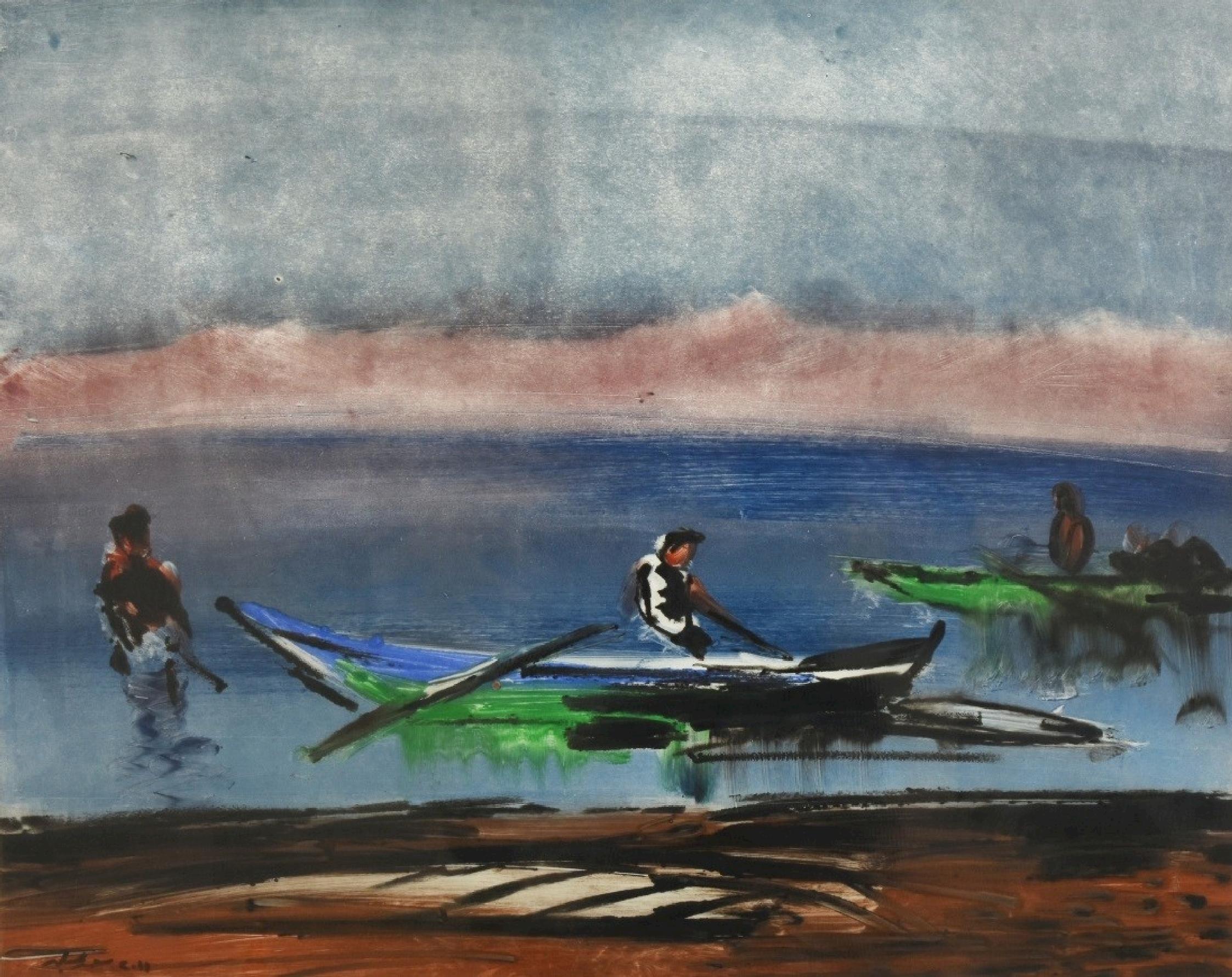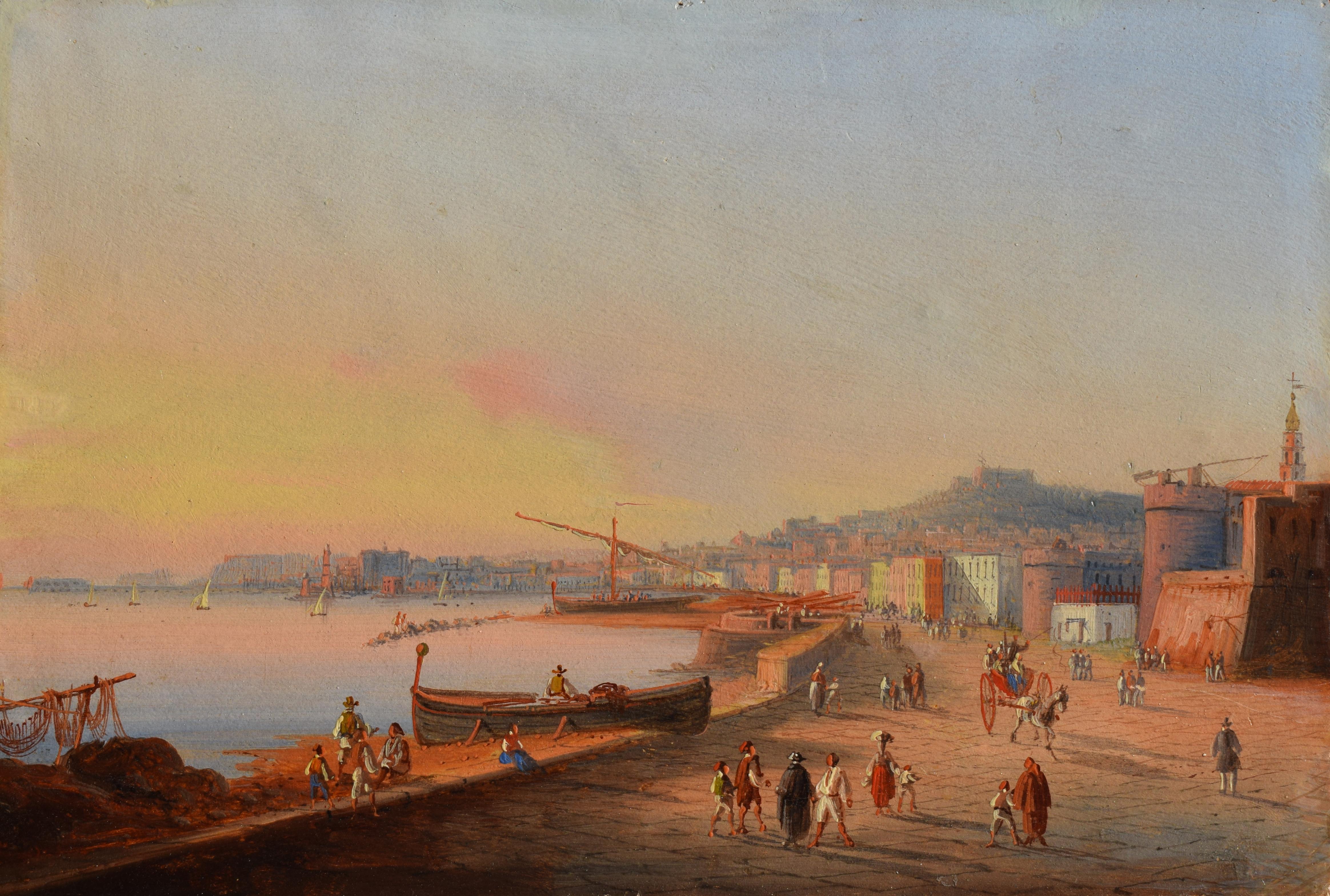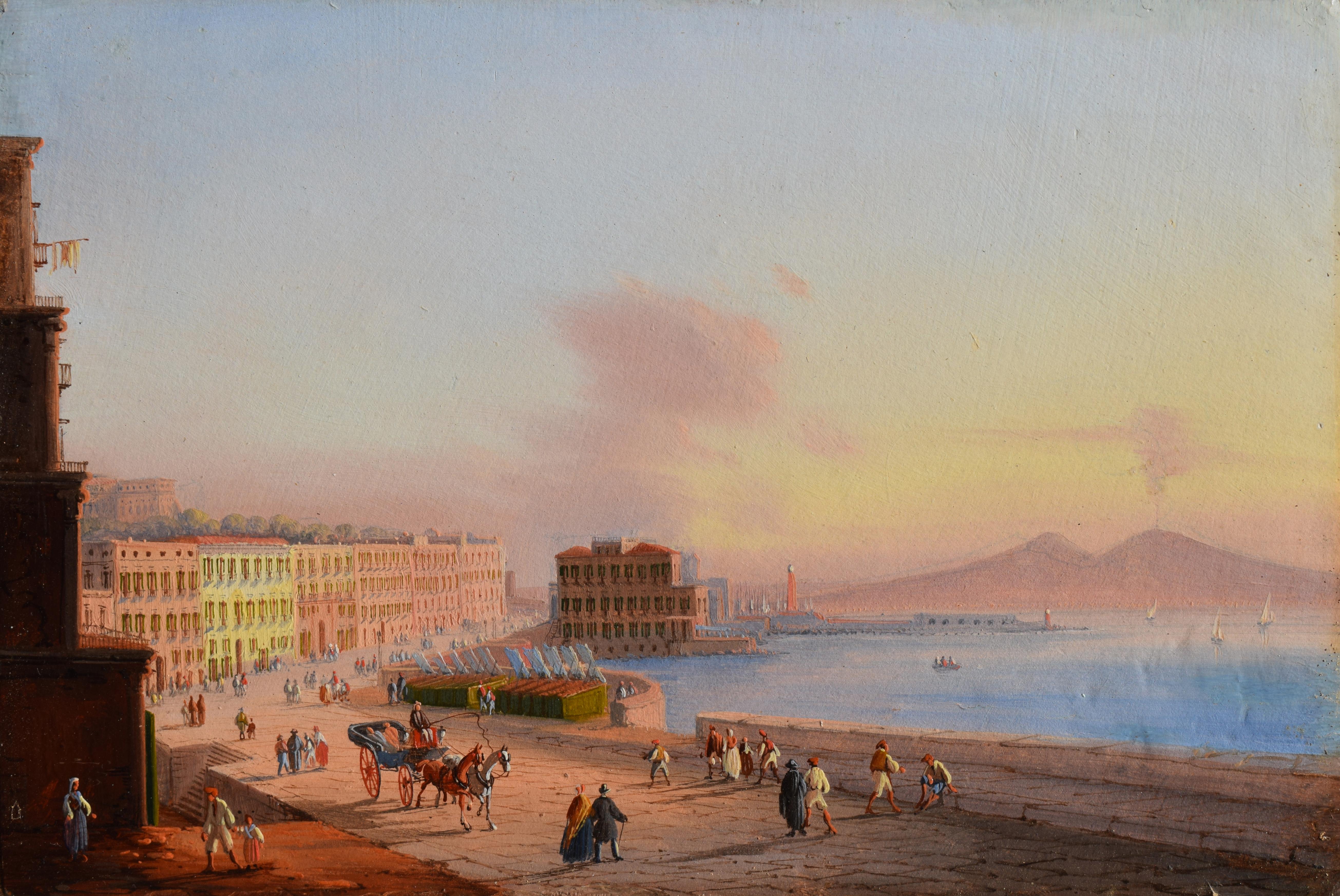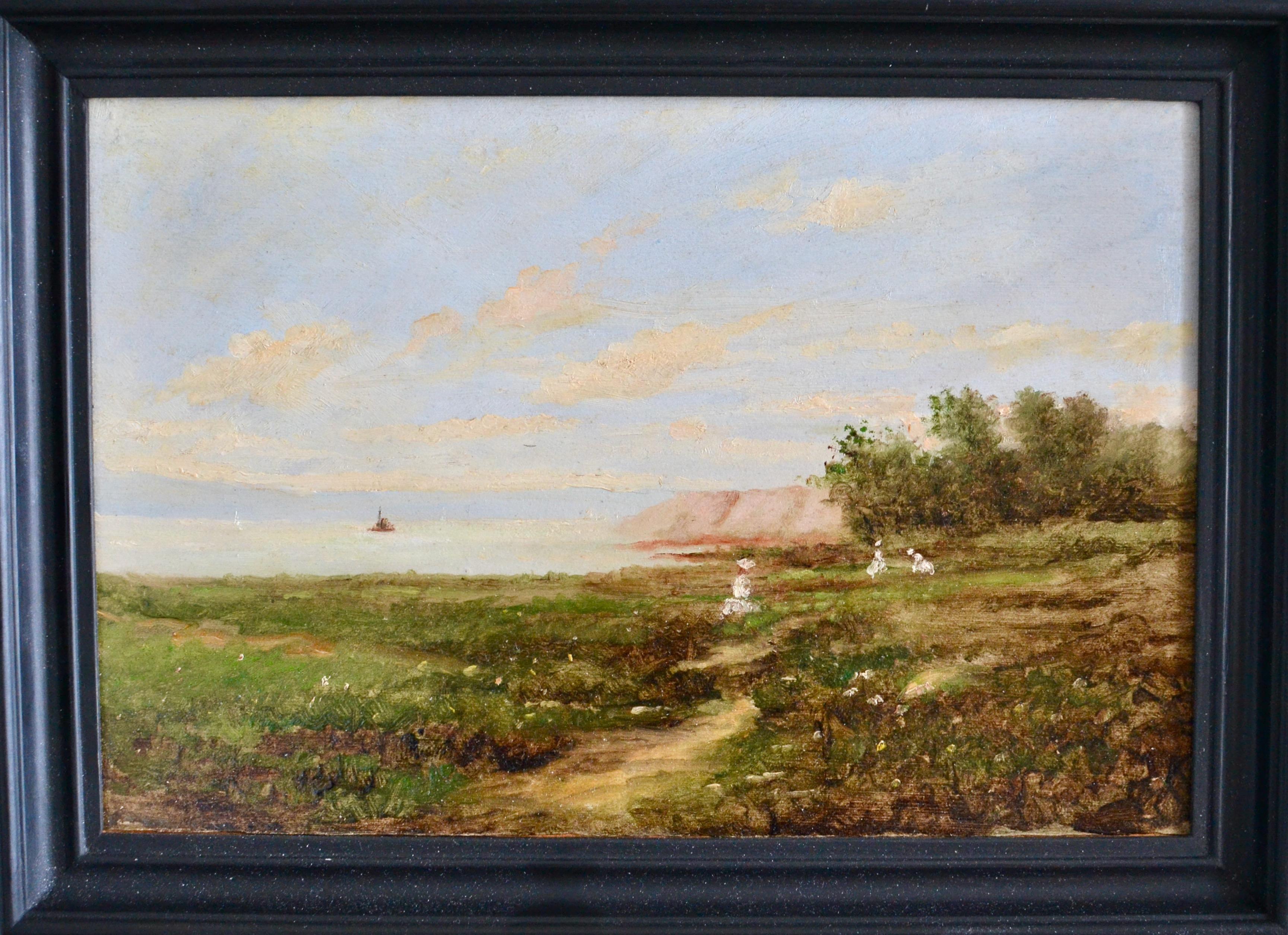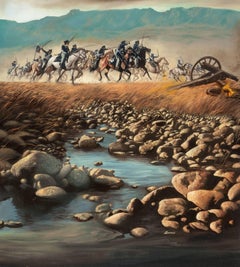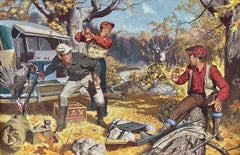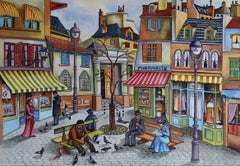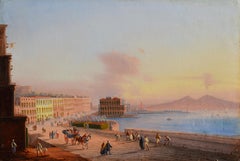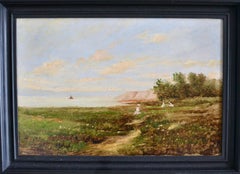Items Similar to The Rawhide Part III
Want more images or videos?
Request additional images or videos from the seller
1 of 6
Maxfield ParrishThe Rawhide Part III1904
1904
About the Item
Medium: Oil on Paper Mounted to Board
Signature: Signed Lower Right, Signed Again and Dated August of 1904 on Reverse
The Rawhide Part III, 'He swung himself into the saddle and rode away.'
Signed with initials M·P (lower right); also signed again Maxfield Parrish, dated August of 1904. and inscribed “The Oaks”/Windsor: Vermont. (on the reverse); also inscribed “Rawhide”. Part III. last paragraph./”Then he swung himself into the saddle and rode away straight down/the narrow arroyo, out beyond its lower wi*ing, into the vast/plain the hither side of the Chiracahuas…Then/suddenly he was gone. The desert had swallowed him up.” (on an original label affixed to the stretcher)
- Creator:Maxfield Parrish (1870-1966, American)
- Creation Year:1904
- Dimensions:Height: 16 in (40.64 cm)Width: 12.125 in (30.8 cm)
- Medium:
- Period:
- Condition:
- Gallery Location:Fort Washington, PA
- Reference Number:Seller: 41321stDibs: LU38436686602
About the Seller
5.0
Recognized Seller
These prestigious sellers are industry leaders and represent the highest echelon for item quality and design.
Gold Seller
Premium sellers maintaining a 4.3+ rating and 24-hour response times
Established in 1995
1stDibs seller since 2016
123 sales on 1stDibs
Typical response time: 1 hour
- ShippingRetrieving quote...Shipping from: Fort Washington, PA
- Return Policy
Authenticity Guarantee
In the unlikely event there’s an issue with an item’s authenticity, contact us within 1 year for a full refund. DetailsMoney-Back Guarantee
If your item is not as described, is damaged in transit, or does not arrive, contact us within 7 days for a full refund. Details24-Hour Cancellation
You have a 24-hour grace period in which to reconsider your purchase, with no questions asked.Vetted Professional Sellers
Our world-class sellers must adhere to strict standards for service and quality, maintaining the integrity of our listings.Price-Match Guarantee
If you find that a seller listed the same item for a lower price elsewhere, we’ll match it.Trusted Global Delivery
Our best-in-class carrier network provides specialized shipping options worldwide, including custom delivery.More From This Seller
View AllOle Devil At San Jacinto, Paperback Book Cover Illustration
By Ron Lesser
Located in Fort Washington, PA
Paperback book cover illustration for Ole Devil at San Jacinto, published by Dell, 1991
“For the Lone Star Freedom Fighters, rebellion became blood-simple revenge.” The Texans were...
Category
1990s Landscape Paintings
Materials
Board, Oil
Calling Farmhands for Pie
By Lawrence Wilbur
Located in Fort Washington, PA
Date: 1942
Medium: Oil on Board
Dimensions: 18.50" x 15.70"
Signature: Signed
Image of woman holding pie and a man calling out to farmhands.
An early 20th-century illustrator work...
Category
1940s Landscape Paintings
Materials
Board, Oil
Original JAX Beer Advertisement, Illustration of an Autumnal Hunting Scene
Located in Fort Washington, PA
Original advertisement for JAX Beer (Jackson Brewing Company, New Orleans, LA), circa 1940s.
In this autumnal scene, a hunting party is enjoying JAX beer at their campsite when a bu...
Category
1940s Figurative Paintings
Materials
Oil, Board
Paris Street Scene
By Ari Gradus
Located in Fort Washington, PA
Medium: Oil on Board
Signature: Signed Lower Right
Category
20th Century Landscape Paintings
Materials
Oil, Board
Mining for Ore, Saturday Evening Post Cover, 1947
Located in Fort Washington, PA
Medium: Oil Painting
Signature: Signed Lower Left
Contact for exact dimensions.
Saturday Evening Post Cover, November 22, 1947
Category
1940s Landscape Paintings
Materials
Oil, Panel, Board
When Couples Meet, Ballantine Beer advertisement, 1953
By John Ford Clymer
Located in Fort Washington, PA
Signature: Signed Center Right: John Clymer
Ballantine Beer advertisement, 1953
Category
1950s Landscape Paintings
Materials
Oil, Board
You May Also Like
"Fishermen" Landscape Painting 20" x 25" inch by Mohamed Abla
By Mohamed Abla
Located in Culver City, CA
"Fishermen" Landscape Painting 20" x 25" inch by Mohamed Abla
Mohamed Abla was born in Mansoura (North of Egypt) in 1953. There he spent his childhood and finished school. In 1973 ...
Category
21st Century and Contemporary Contemporary Landscape Paintings
Materials
Paper, Oil, Cardboard
Old Marinella coastal road, on the right the Fort of Carmine
Located in Roma, RM
Salvatore Candido (Naples 1798 - 1869), Old coastal road Marinella, on the right the Forte del Carmine
Oil painting on paper glued on board 20 x 29 cm.
Category
Early 19th Century Academic Landscape Paintings
Materials
Paper, Oil, Board
Santa Lucia, Naples
Located in Roma, RM
Salvatore Candido (Naples 1798 - 1869), Santa Lucia, Naples
Oil painting on paper pasted on board 20 x 29 cm .
Category
Early 19th Century Academic Landscape Paintings
Materials
Paper, Oil, Board
Landscape with Women Picking Flowers, Possibly on Island of Mön
Located in Stockholm, SE
A fine small plein air study of three women picking flowers on the meadow next to white cliffs and sea. In the horizon where the sky ends, the contours of mainland is visible as a sh...
Category
Late 19th Century Naturalistic Landscape Paintings
Materials
Paper, Oil, Cardboard
Il ponte dell´Ariccia, Ariccia and The Alban Hills
Located in Stockholm, SE
A beautifully painted en plein air view of
"Il ponte dell´Ariccia", Ariccia, and The Alban Hills by Joachim Ludwig Heinrich Daniel Bünsow (Kiel 1821-1910 Ebenda). Oil on paper laid on cardboard.
Bünsow received his training at the Royal Danish Art Academy from 1839 to 1848 with Johann Ludwig Lund and Christoffer Wilhelm Eckersberg. He then traveled to Dresden, where he joined Johan Christian Dahl's circle. A scholarship from the Copenhagen Academy enabled Bünsow to stay in Rome from 1853 to 1858 which is in the period when this painting was made. While Bünsow's early painterly work was based on the fine-toned and naturalistic style of his teachers, the landscapes he created in Italy were influenced by Louis Gurlitt and were more atmospheric and idealizing.
Fredrik Bünsow, the son of his brother, Joachim Johann Friedrich Bünsow, also a painter, became a wellknown industrialist and businessman in Stockholm, Sweden. Included in this post is a photo of the family palace that was built 1886-1888 and an interior photo with some other Bünsow paintings hanging on the walls. This painting has been in the Bunsow family until present day.
At the beginning of the 19th century, following some economic development, the local government started pushing the Papal State to make the Appian way safer, faster and more accessible. The only possible solution was to build bridges that would cross the Ariccian valley, the two valleys to reach Galloro and finally the ‘Vallone’ to overcome the slope and leave Colle Pardo behind on the way to Genzano.
Therefore, in order to adapt to the difference in altitude, in 1843 Pope Gregorius XVI had a six-arched bridge constructed. In the meanwhile, a new route of the Appian Way was being planned – equipped with two more bridges, the Saint Roch Bridge and another minor one, in addition to the large bridge to be built over the Ariccian ‘Vallone’. Construction did not stop with the Pope's death in 1846, and was completed by his successor Pius IX, who entrusted the Monumental Bridge project to an architect from Marche, Ireneo Aleandri, while the execution of the work was entrusted to Giuseppe Bertolini.
Work was completed in 1854 and is one of the most important engineering achievements of the 19th century: set on three orders of arches in elegant neoclassical style inspired by Roman art, the bridge is 59 metres high and 312 metres long. Two travertine columns were erected on both ends to recall the Roman milestones...
Category
1850s Other Art Style Landscape Paintings
Materials
Paper, Oil, Cardboard
£4,849 Sale Price
25% Off
Free Shipping
Cornish Fishing Boats At First Light Mid-20th Century Cornwall Original Painting
By Joan Gillchrest
Located in Sutton Poyntz, Dorset
Joan Gillchrest.
English ( b.1918 - d.2008 ).
Cornish Fishing Boats At First Light.
Oil On Paper Mounted On Board.
Signed Monogram Lower Right.
Image size 26.2 inches x 22 inches ( 66.5cm x 56cm ).
Frame size 35.8 inches x 31.3 inches ( 91cm x 79.5cm ).
Available for sale; this original oil painting is by the Cornish artist Joan Gillchrest and dates from around the late 1980s.
The oil painting is presented and supplied in a sympathetic new replacement frame (which is shown in these photographs) that suits the artwork’s color palette and behind non-reflective Tru Vue UltraVue® UV70 glass.
This painting is in excellent condition and presents superbly. It wants for nothing and is ready to hang and display.
The painting is signed with her monogram lower right.
Joan Gillchrest is one of Mousehole’s and Cornwall’s most recognised and celebrated artists. Her vibrant art sits firmly alongside other great artists of the St. Ives School from the 1960s.
She was born Joan Scott in London in 1918 into a wealthy and illustrious family. She was the third of four children. Her father was a pioneer of radiology – and a skilful caricaturist - and her Australian mother was an accomplished pianist. Sir George Gilbert Scott was her great grandfather, who designed the imposing Midland Grand Hotel at St. Pancras as well as countless parish churches. Grandfather, George Gilbert Scott Jnr, is remembered for three Cambridge colleges, Christ’s, Pembroke and Peterhouse. Her uncle Giles, (Giles Gilbert Scott) to whom Joan was close, is best known for his magnificent Anglican Liverpool Cathedral, Battersea Power Station and the iconic and ubiquitous red telephone box. Coming from such a long line of eminent architects it is not surprising that Joan always loved architecture and the churches and chapels of the Penwith peninsula feature prominently in her work. She said that buildings were “in her blood”.
Her early childhood was spent at the family home in Buckinghamshire, but she was a difficult child – the family hired one nanny for her and one for the other three children- and at one point she was sent to Upper Chine School in the Isle of Wright to give her family some peace! She was however the apple of her father’s eye and he encouraged her obvious artistic talent.
In 1934, aged only 15 but encouraged by her parents, she went to Paris to study art and learn the language. There she met Gwen John and studied in various studios, sometimes working as a model.
In 1936 she enrolled at the Grosvenor School of Art and subsequently studied there under Iain McNab, whom she described as a marvelous teacher. Her early artistic career was very promising; she first exhibited at the Royal Academy when she was just 18 and showed works at the New England Art Club in 1937 and the London Group in 1938.
When the Second World War broke out Joan was 21. She took a crash course in nursing and first aid and volunteered as an ambulance driver for Westminster Hospital. She later drove a mobile rescue unit. She was not able to paint much during the war but kept in touch with McNab; when the area around St Paul’s was blitzed, leaving the cathedral relatively unscathed, McNab got Joan and a few others to paint the scene. Her work, created with a thick paint and a palette knife, hung in the art school for many years.
Joan’s painting career stalled in the 1940s. In 1942 she married a barrister and Coldstream Guards officer Samuel Gillchrest, and they soon had a son, then a daughter. With a young family, she had little time to paint, and had to hide the work she did produce as her husband thought that work as an artist was beneath them. Sadly, the marriage broke down and in 1953 they divorced. In leaving a difficult marriage at this time, she forfeited money, security and her previous place in society.
Despite the huge changes in her life, her overwhelming desire to paint remained constant. She ignored the disapproval of her friends and family and started to explore new ways of expressing herself on canvas. She moved to a studio in Chelsea, an area much favored by the artistic community. To support herself, her children and her painting she also found regular work as an artist’s model. She was tall, strikingly good looking and combined elegance with bohemianism. She also carried an air of mystery from her rich and privileged past, and so she became sought after as a fashion model.
In the flat below hers lived an artist who had enjoyed some professional acclaim, Adrian Ryan...
Category
Mid-20th Century Modern Landscape Paintings
Materials
Paper, Oil, Board
Recently Viewed
View AllMore Ways To Browse
Sign Board Oak
Oak Side Board
Antique Side Saddle
Antique Side Saddles
Antique Vermont
Maxfield Parrish Original
Maxfield Parrish Original Paintings
Heart Sculpture Resin
Joan Miro Lithograph Ii
Lady Liberty
Large Black And White Desert Print
Led Zeppelin
Malibu Print
Marina Picasso Collection Limited Edition Lithographs
Mourlot Original Exhibition Posters
Paul Wearing
Photograph Of Keith Haring
Polish Lithograph
